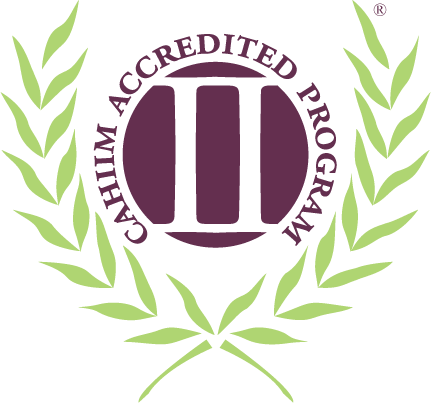Health information professionals are involved in the design, collection, storage, utilization, and transmission of data required to meet the professional, legal, financial, and administrative record- keeping requirements of healthcare delivery systems. They work with clinical, financial, epidemiological, administrative, and coded healthcare and insurance data.
The Health Information Technology - Data Management program provides an understanding of the many aspects of the emerging field of the healthcare technology field. This associate degree program provides a concentration in data management and will provide students the skills necessary to enter the job market in a health information technician role.
Accreditation Statement
.png)
The HEALTH INFORMATION MANAGEMENT accreditor of Connecticut State Community College Middlesex is the Commission on Accreditation for Health Informatics and Information Management Education (CAHIIM). The College’s accreditation for ASSOCIATE degree in HEALTH INFORMATION TECHNOLOGY - Data Management has been reaffirmed through 2029-2030. All inquiries about the program’s accreditation status should be directed by mail to CAHIIM, 200 East Randolph Street, Suite 5100, Chicago, IL, 60601; by phone at (312) 235-3255; or by email at info@cahiim.org.
Program Outcomes for Academic Years 2020-2021, 2021-2022, and 2022-2023
Graduation rate definition: The percentage of a school’s first-time, first-year undergraduate students who complete their program within 150% of the published time for the program.
- 2021 Graduation Rate for first-time, first-year students: 18%
- 2022 Graduation Rate for first-time, first-year students: 25%
- 2023 Graduation Rate for first-time, first-year students: 0%*
*There were no first-time, first year students in the 2023 graduate cohort; all of the 2023 graduates were transfer students.
Employment rate definition: The percentage of graduates from a program who are employed within a specified time frame (6 months). Generally, graduates pursuing further education are not included in the total.
- 2021 Graduates Employment Rate: 100%
- 2022 Graduates Employment Rate: 66%
- 2023 Graduates Employment Rate: 83%
4-year undergraduate program entry rate/Academic progression rate definition: The percentage of a school’s graduates who progress to a 4-year undergraduate program upon completion.
- 2021 Graduates Academic Progression Rate: 50%
- 2022 Graduates Academic Progression Rate: 25%
- 2023 Graduates Academic Progression Rate: 83%
Program Admission
As a Selective Admissions Program, applicants must meet requirements in addition to the CT State general application.
Application available:
- For a Spring semester start: June 1 to December 1
- For a Fall 2025 start: October 1 to August 1
Admission Requirements:
- Must attend Health Information Technology information session within one year prior to the application deadline.
- Course Requirements:
- ENG 1010 Composition with a “C” or better.
- BIO 1111 Cell Biology with Organ Systems with a C or greater OR the prerequisite course(s) required for BIO 2111 Anatomy & Physiology I eligibility (i.e., BIO 1210 General Biology with a C or greater). Completion of BIO 2111 Anatomy & Physiology with a C or greater will also fulfill the requirement.
- Eligibility for MATH 2200 Statistics II which can be met by completing MATH 1200 or MATH 1201 with a C- or higher or placement using multiple measures
Prospective students are encouraged to contact the Program Coordinator with questions:
Jill Flanigan, Program Coordinator and Assistant Professor
CT State-Middlesex
jflanigan@mxcc.commnet.edu
Professional Certification
Graduates of the Health Information Technology - Data Management degree program are eligible to sit for American Health Information Management Association (AHIMA) Registered Health Information Technician (RHIT®) certification exam. A credential provides proof of competency in the field and is often a requirement for Health Information Management positions.
Program Learning Outcomes:
- Apply knowledge of data content structure and standards to evaluate data sources to apply classification system guidelines including current and future revisions of the International Classification of Diseases, Clinical Modification; International Classification of Diseases, Procedure Coding System; Current Procedural Terminology (CPT); Healthcare Common Procedure Coding System, Level II (HCPCS II); Systematized Nomenclature of Medicine (SNOMED) and ensure health record documentation is complete and accurate.
- Protect health information by controlling access, ensuring information security, and understanding the legal and ethical issues in the use of health data.
- Participate in the implementation and use of information technology in the healthcare organization including establishing data standards, ensuring data quality, utilizing decision support tools, and performing data analysis.
- Utilize healthcare data to manage the revenue cycle of the healthcare organization through understanding of payment methods and systems in all care settings.
- Evaluate organization compliance with regulations and standards to support licensing, accreditation, and reimbursement.
- Apply information governance principles by collecting, storing, protecting, and using organizational data strategically, especially in performance improvement activities.
- Understand and apply knowledge of pathophysiology, pharmacology, anatomy & physiology, medical terminology, computer concepts and computer applications as they relate to health information management.
- Utilize professional skills to enter the healthcare workforce in a health information technician role with the skills and competencies to earn professional certification, communicate in a healthcare business setting, and develop a professional network.
All courses are offered fully online, allowing students to access the program from any location.